In a previous post, I confessed (as we mystery lovers tend to do) that every year I force my drama students to submit to honoring my passion for classic mysteries by engaging them to come up with an original mystery play of their own. It’s a complex and difficult project, and many tears are shed during the process . . . most of them by me. This morning, as I ate my cereal, I contemplated making this the last year I do mysteries. As we all know, coming up with a workable mystery plot that plays fair is hard! Very very hard! And in high school, working in a group on anything is next to impossible! The workers hate the sloths! The shy kids hate the bossy ones. And the 14-year-old boys all possess a loose gene that switches their attention spans to something different every five minutes. And the gum! I hate the gum! I could murder somebody over the gum . . .

Yet there’s a prize at stake: the group that plays fair and fools the most audience members at the end gets a cool reward for each of its members. (The box of shiny new Christie novels is sitting in my car!!) And who doesn’t love playing for prizes??? Mystery writers, come on down!!! Plus, in all seriousness, there is something to be said for accomplishing a task that was really, really challenging! And then, of course, there’s the fact that the teacher is obsessed – obsessed – with murder mysteries!
In addition to having to create a closed circle of interesting suspects in a striking setting, a murder with clues, and a detective – either professional or amateur – to investigate and solve the crime, I require each group to choose a year in the past to inspire their setting. For example, I’ve had mysteries in other years take place in a Victorian opera house, on a zeppelin in the 1920’s, a WWII submarine in German waters, and a Wild West saloon. Anyway, I thought it would be fun to share with you what this year’s batch of mysteries is shaping up to be after a painful month-long process. Performances take place in three weeks, and if you’re interested, I’ll let you know which groups won.
SECOND PERIOD
This is my stronger class, and they have come up with some great stuff, not only in terms of the mystery but in finding fascinating details in the year they picked to incorporate into their stories.

110 C.E.
This group did a LOT of research on ancient Roman culture in order to come up with their plot. Trajan, the nasty, grotesque emperor, has captured one of his mortal enemies and invites his closest advisors, representing finance, intellect, the military, and the spiritual, to a great dinner to counsel him on what to do with the prisoner. The nobleman in charge of finance has died, and his daughter comes in his place, inviting Trajan’s disdain for women in such high position. The spiritual guide is an oracle and secretly of Greek extraction, and the military guy is very ambitious to succeed the Emperor. Everybody argues at the dinner table while the prisoner shakes his chains and threatens the Emperor with death. Trajan is careful in that he has his lowly servant Anastasia sample his food for poison. But at the end, when Trajan inserts a feather down his throat to vomit up his food, he dies a horrible death by poisoning. (This is not a pretty scene to watch.) It’s up to the scholar amongst them to sort out the motives and figure out exactly how Trajan – and nobody else – was poisoned. Fans of Agatha Christie’s 1940’s novels should spot the trick here!
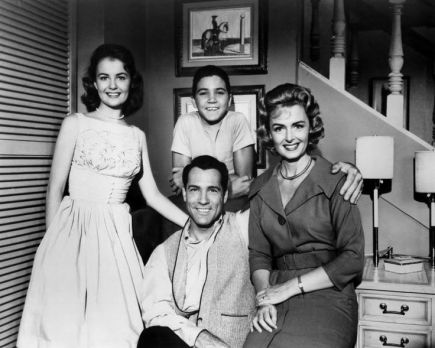
1955
This group wanted to play with the assignment of gender roles during this decade, as manifested in TV sitcoms like The Donna Reed Show. What I really love about this group is the way they deliver their plot. A homicide detective is baffled by his latest case, and it is making him grumpy at home. His loving but exasperated wife suggest that, like always, he unburden himself of the facts of the case to her, and together they will solve it. As he describes the events and the people involved, they appear in the couple’s living room, freezing and changing like TV images as the case unfolds. The mystery concerns one of those “perfect” 1950’s guys, who is actually a terrible husband, father, neighbor and businessman. Of course, that makes the suspect list pretty obvious: his wife, his daughter, his neighbor, his friend, and his business associate (who harbors a secret about “his” gender!) I’m not sure that they have the “fair play” element down yet, but this group is thinking hard about how a mystery can reveal, and be influenced by, its social context.

1969
The moon landing prompts a wealthy man associated in some (too vague) way with the space program to invite key people to a party aboard his luxury jet. In the air, things get very tense due to the host’s nasty wife who seems to be breaking up everybody’s marriage and may be a Russian spy! (Two of the students in the group have Russian ancestry.) This is the story I understand the least so far. We’ll see if they can get their airplane mystery off the ground!

1972
This one takes place in a police station! (First time!) A young and dedicated cop, the recipient of many medals, is murdered at the end of the workday. Two strikes against this officer: she’s a woman, and she had openly declared herself to be a lesbian. I remember in 1972 how things were just starting to change after the social explosions of the 60’s, and the group is trying to make use of this now. There’s the male officer who resents a woman in his position. There’s the old school receptionist who sees the victim’s “advancement” as an affront to womankind. There’s the Vietnam vet who is stealing drugs from the evidence room to support a habit he developed during the war. There’s the other woman cop who has been in a secret relationship with the victim . . . and wants to keep it a secret.
SIXTH PERIOD
Afternoon classes are the hardest! You’ve got a handful of kids who actually love mysteries and are trying their hardest, a pair of seniors with raging senioritis who don’t always quite make it to class, and a few kids who you have to wonder why they bothered signing up for drama. So things are developing a little more slowly here. With one exception, these groups haven’t merged the social context of the year they have chosen with their plotline as effectively as the morning class has. But there are some fun stories developing.
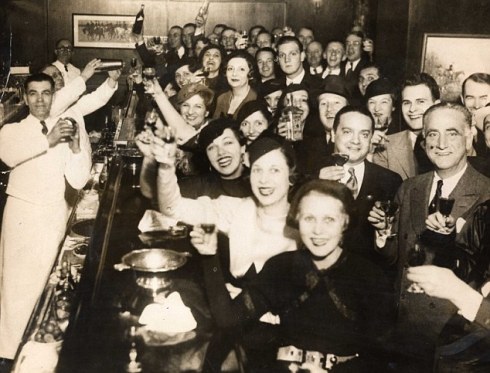
1925
It’s Prohibition, and we are in a speakeasy owned by a powerful Mafia clan. I don’t know why every year somebody wants to do this very plotline. It isn’t like kids of this age have studied Prohibition or seen The Godfather. But it was a big deal in the 1920’s, as the picture of Nucky Johnson’s speakeasy above attests. And this group is having a good time. A Mafia don has decided to pass up his goofy older son from inheriting his criminal kingdom and has bestowed his legacy upon his ruthless younger son (played by the least ruthless kid in the class!) This doesn’t sit well with the older son or with his gold-digging girlfriend. The female head of a rival mob who wants to merge with the Don isn’t pleased when the younger son dismisses her as “just a dame.” The drunken cop who is being blackmailed to do the Don’s dirty work hates the way the younger son mistreats him; so does the cop’s ex-wife, who blames the Mafia for her destroyed marriage. When the younger son is poisoned, the Don orders the cop to investigate. But did the right person die after all??
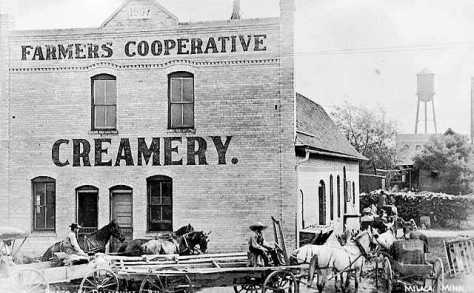
1937
It’s the Great Depression, and this group seems to have channeled Of Mice and Men or some other Steinbeck novel for their story of a young brother and sister who own a farmhouse but no longer have the wherewithal to run it. So they allow a businessman who has lost his factory to move in and run their business. Unfortunately, the man has brought his wife, who makes Curley’s seductive mate in OMaM look like Miss Marple. She goes after the brother, she goes after the silent farmhand, and it isn’t hard to tell who’s going to wind up dead at the end of Act One. The idea of a farming cooperative during the Depression is the strongest in this class so far.

1977
This one concerns a successful lawyer celebrating his birthday in a hotel, who invites his nearest and dearest to the penthouse to continue celebrating after the party. He dies, and it turns out not only that nobody liked him – not his partner, not his brother or sister-in-law, not his secretary – but that some past case haunts him. I’m not sure how this connects to the time period at all, but the student who has basically made the script happen is one of the most enthusiastic mystery fans of the lot, so I wish them well. I’m still not sure if the shrimp canapés were poisoned, or why the victim would invite his obnoxious relatives to this party, but all will be revealed forthwith!
 1987
1987
Well, Bernie Madoff didn’t commit his dirty deeds until after the millennium, but this case involves a late financial billionaire who is also suspected of having cheated his clients before his death. Otherwise, this case could be transplanted to the 20’s or 30’s as it’s pretty Golden Age-style: the gathering of the clan for the reading of the will – and it’s not the will everyone was expecting – which leads to murder. The detective is an investigator into financial fraud who has gotten herself hired as the new maid. No group has suffered the slings and arrows of poor attendance as badly as this one has, so it will be a real coup if they can pull this mystery off together!
There you have it: this year’s list of student-generated mysteries. Which is your favorite plot line?? I love watching them come together, and yes, I suffer the same pangs along with the students as they find a new obstacle to surmount every day. But I believe that all of them – okay, three or four of them – will look back on the experience with fondness. And when I hand out those prizes to the winners, all those kids – well, a couple of them anyway – will hold those books in their hands with pride and hopefully begin a lifelong passion for Christie.
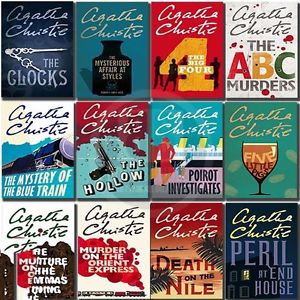
That, at least, is the plan.
P.S. The cartoon at the top of this post (and below) was drawn by a brilliant former student, Nick Balian, who just got an assignment with Disney Publishing. I guess the “Adventures of Friedman, the Drama Teacher” comic book will have to wait, Nick . . .
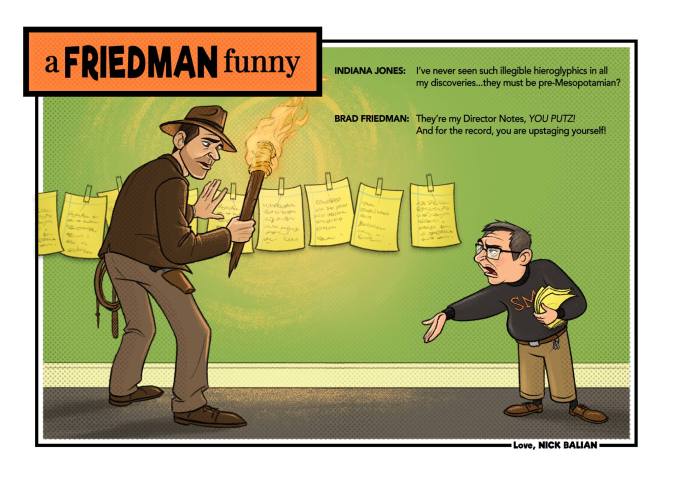
Your students have such creative ideas, Brad! I love it! And I really do hope you continue this project. I’m utterly convinced that your students benefit from it, and will see that themselves as they mature. Such a great way to give them ownership of what you’re teaching, too!
LikeLiked by 1 person
When I first saw the moon landing picture, I thought you had one set on a top-secret, unknown manned mission to the moon. 🙂 I’m kinda partial to the 1969 one–just because it’s my year. But the 1955 plot could be interesting if they can work on the fair play to go with the consideration of gender roles.
LikeLike
Honestly, Bev, I don’t think they thought enough about this issue in the ’55 story. They made assumptions based on their own discussions of what the audience would know. They’re still working on clueing this one properly. But every other aspect of it is dramatically interesting!
LikeLike
The prize — a box of shiny new Christie novels?! Wow, we need more teachers like you! Not only do the prize encourage students to read –especially in a culture of young people that read text messages more than a literal book — but hopefully they will become life-long fans of the Queen Of Crime. Those winners will certainly have a treat waiting for them, and thank goodness Christie was so prolific. Brad, have you ever assigned a Christie book or play to read for your class?
LikeLike
No, because frankly her plays aren’t rich enough as dramas to warrant deep study. But I’ve directed four of her plays at school!
LikeLiked by 1 person
What were the four plays?
LikeLike
The Hollow.
The Mousetrap
And Then There Were None
and A Murder Is Announced (which Christie didn’t write and which I had to really work on)
LikeLiked by 1 person
There is a copy of the play AMIA out there adapted by Leslie Darbon and I thought about buying it, even though Christie never adapted the story onto the stage. I know that a few characters are omitted taking away from the full experience of the story. This is a Christie with very good, distinct characterization. But of course, there are some differences between the book and the play as expected when adapting a book for another medium. At the end, if I’m not mistaken, as the cake Delicious Death is carried out by Inspector Craddock, I think, everyone is hesitant to eat it and only Miss Marple and the Inspector partakes of it.
We know that Christie never penned this play onto the stage but if given the opportunity I don’t think she would have. Christie never adapted a “whodunit” onto the stage, to my knowledge, that had the drawing room denouement where the viewers experience sudden retrospective illumination. This is probably hard to pull off quite successfully and Christie knew this and never took to attempting it which is why stories like AMIA was never adapted.
LikeLike
Except they WERE . . . only by someone else! In addition to AMIA, there’s an adaptation of Cards on the Table and one of Murder at the Vicarage, both available for production. I’m not saying they’re good, although VICARAGE does have Miss Marple! Darbon cut way too many characters out of AMIA. I put the Easterbrooks back in, but we lost Hinchcliffe and Murgatroyd and Bunch Harmon. We still had fun, and I was very proud of my Misses Marple and Blacklock!
LikeLiked by 1 person
Leslie Darbon wrote 2 other plays based on Agatha Christie novels: Cards On The Table and Murder At The Vicarage.
LikeLike
Ha! I beat you to the punch this time, Santosh! So there!!! 🙂
LikeLike
I think if Agatha Christie did adapt AMIA, she wouldn’t have put Miss Marple in there, I don’t think. The Hollow didn’t have Poirot but we know that Christie thought as she looked back that the book would have done well without him. She never put Poirot onto the stage and I don’t think she would have done so with Miss Marple either.
LikeLike
Poirot and Marple are altogether different. Christie did put Poirot into her original play Black Coffee. All in all, however, she didn’t like the way the character was cast on stage or screen, and his ratiocinative nature was less conducive to drama. (It worked brilliantly on TV however!) I think Marple would have worked onstage; Christie just never bothered, but then, her mysteries are more village-centered and hard to limit to one set. I think Darbon put all of VICARAGE into the vicar’s study, or maybe the action moved to Miss Marple’s sitting room. I’m too lazy to get up and check! 😦
LikeLike
Wow, I was impressed by most, if not all, of the preliminary storylines: they seem like effective adaptations of Golden-Age tropes. My big hope is that one of your students, inspired by these classes, would turn out eventually to be a mystery writer who churns out more Golden-Age style novels in the near future. 😀
LikeLiked by 1 person
Do you think that former student would thank me at the Edgar Awards???
LikeLike
Actually, if your classes were the beginning of his or her career in writing classic crime plots, then I daresay yes! 😀
LikeLike
It’s interesting. Even though we have multiple groups doing separate stories and different settings, they all hit the plot beats of the cliched mystery: unlikable victim, surrounding themselves with people who all have motive to plunge a knife into their chest….I’m not sure what to make of it, though I admit you have to be economical with these short plays/stories. 😛
Also, I think I know how the emperor was poisoned. 😛
LikeLike
Sounds awesome, Brad, and I’m massively jealous that you’ve been able to work this into your professional obligations — oh, that the teaching of GCSE Maths leant itself to such an approach…!
Also, I presume that pocture of the Christie books is illustrative, right? You’re not going to convince anyone to pick her up if after all that work their prize is a copy of The Clocks…
LikeLiked by 1 person
It’s from the Googleverse, JJ, of course! 🙂 I have as much fun picking out the Christies I’m gonna give as I do teaching the project.
LikeLike